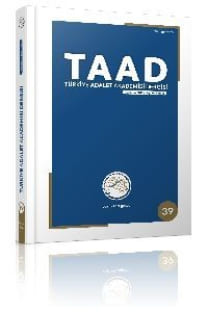Medeni Hukuk Açısından Yapay Zekânın Hukuki Statüsü ve Yapay Zekâ Kullanımından Doğan Hukuki So
Yapay Zekâ, Makine Öğrenimi, Derin Öğrenme, Avrupa Parlamentosu, Elektronik Kişilik, Kusursuz Sorumluluk, Etik
The Legal Status of Artificial Intelligence With Regard to Civil Law and The Liability Thereof
Artificial Intelligence, Machine Learning, Deep Learning, European Parliament, Electronic Personhood, No-Fault Liability, Ethics,
___
- ALEXANDRE, Felipe Maia, “The Legal Status of Artificially Intelligent Robots” (https://papers.ssrn.com/sol3/papers.cfm?abstract_i d=2985466)
- BAYAMLIOĞLU, Emre, “Akıllı Yazılımlar ve Hukuki Statüsü: Yapay Zekâ ve Kişilik Üzerine Bir Deneme”, Uğur Alacakaptan’a Armağan, B.1, İstanbul 2008.
- BOZKURT YÜKSEL, Armağan Ebru, “Robot Hukuku”, TAAD, Yıl. 7, S. 29, 2017, 85-223.
- BOZKURT YÜKSEL, Armağan Ebru/BAK, Başak, “Yapay Zekâ”, Futurist Hukuk, İstanbul 2018.
- CALO, Ryan, “Robotics and the Lessons of Cyberlaw”, California Law Review, S. 103, 2015.
- ÇEKİN, Mesut Serdar, “Otonom Araçlar ve Hukuki Sorumluluk”, TAAD, Yıl. 9, S. 33, 2018, 283-301.
- DURAL, Mustafa/ÖĞÜZ, Tufan, Türk Özel Hukuku Kişiler Hukuku, C. II, İstanbul 2009.
- EREN, Fikret, Borçlar Hukuku Genel Hükümler, B. 18, Ankara 2015.
- HAVUTÇU, Ayşe, Türk Hukukunda Bir Örtülü Boşluk, İstanbul 2005.
- HINTZ, Arend, “Understanding The Four Types of AI, From Reactive Robots to Self-Aware Beings”, (https://theconservation.com/understandig-the-fourtypes-of-ai-from-reactive-robots-to-self-aware-beings-67616)
- KILIÇOĞLU, Ahmet, Borçlar Hukuku Genel Hükümler, B. 19, Ankara 2015.
- KIRCA, Çiğdem, Ürün Sorumluluğu, Ankara 2007.
- LI, Deyi /DU, Yi, Artificial Intelligence with Uncertainty, New York 2007.
- LIN, Patrick/ABNEY, Keith/BEKEY, George, “Robot ethics: Mapping the issues for a mechanized world”, Artifical Ingelligence, S. 175, 2011, 942-949.
- MCCARTHY, John “Epistomological Problems of Artifical Intelligence”, 1977.
- (https://www.cs.ucf.edu/~dcm/Teaching/COT481Spring2011/Presentations/ epistemological.pdf)
- MILLINGTON, Ian/FUNGE, John, Artifical Intelligence For Games, B.2, New York 2009.
- REPORT WITH RECOMMENDATIONS TO THE COMMISSION ON CIVIL LAW RULES ON ROBOTICS, European Parliament, (http://www.europarl. europa.eu/sides/getDoc.do?pubRef=-//EP//TEXT+REPORT+A8-2017- 0005+0+DOC+XML+V0//EN)
- RICHARDS, Neil M., “How should the law think about robots?”, We Robot 2012, Inagural Conference on Legal and Policy Issues Relating to Robotics, April 21- 22, 2012, University of Miami School of Law. (http://robots.law.miami.edu/ wp-content/uploads/2012/03/RichardsSmart_HowShouldTheLawThink.pdf)
- TORRANCE, Mark, “AI vs Machine Learning vs Deep Learning”. (https://www. youtube.com/watch?v=3WhpAKJcggl)
- YETİM, Servet, “Sürücüsüz Araçlar ve Getirdiği/Getireceği Hukuki Sorunlar”, Ankara Barosu Dergisi, S. 1, 2016, 127-184.
- WENG, Yueh-Husuan/CHEN Chien-Husuan/SUN, Chuen Tsai, “Toward the Human-Robot Coexistence Society: On Safety Intelligence for the Next Generation Robots”. (https://works.bepress.com/weng_yueh_hsuan/1/)
- http://www.bbc.com
- http://www.dailymail.co.uk
- https://www.dailystar.co.uk
- http://www.differencebetween.com
- http://www.europarl.europa.eu
- https://www.futurism.com
- http://www.iflscience.com
- https://www.internetsociety.org
- https://www.livescience.com
- https://www.reuters.com
- https://www.theguardian.com
- http://www.telegraph.co.uk/technology
- https://www.theverge.com
- ISSN: 1309-6826
- Yayın Aralığı: 4
- Başlangıç: 2010
- Yayıncı: Türkiye Adalet Akademisi
Çağımızın Pandemisi: Nefret Suçları
Mustafa Serhat ŞEN, Mustafa Serhat ŞEN
Fatih KAPLANHAN, Hüseyin Çağrı BAŞER
Bir Temel Hak Olarak Unutulma hakkı
AVUKATLARIN GERÇEĞİ SÖYLEME YÜKÜMLÜLÜĞÜ
AİHM’nin İnsan Hakları Alanında Oynadığı Anayasa Mahkemesi Rolü
Uluslararası Bir İnsan Hakları Belgesi Olarak Arap İnsan Hakları Sözleşmesi
Boşanma Sonucunda Birlikte Velayetin Türk Hukukunda Uygulanabilirliği Sorunu
KİŞİ DOKUNULMAZLIĞI HAKKI BAĞLAMINDA RIZA OLMAKSIZIN YAPILAN TIBBİ MÜDAHALELER
